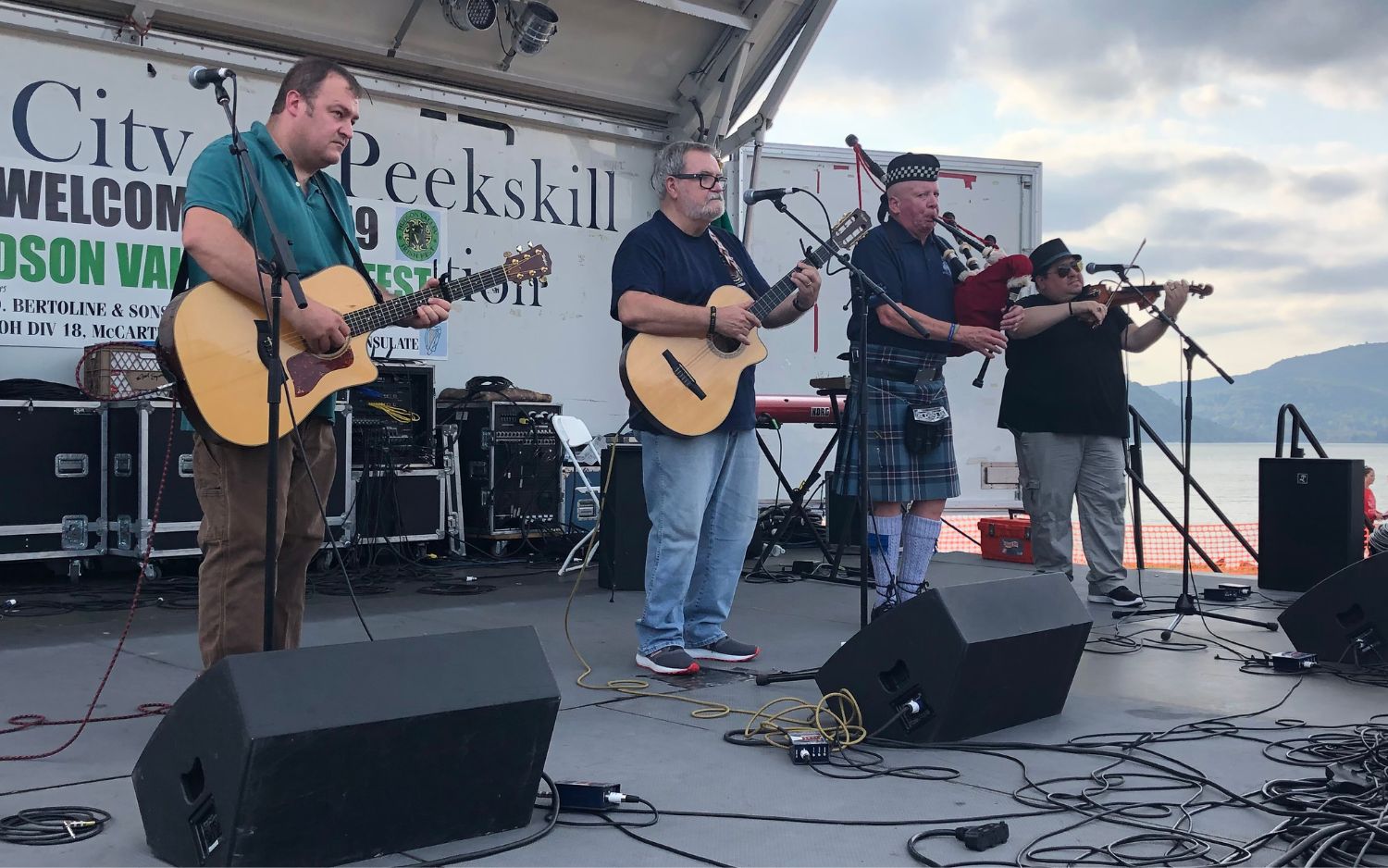| Then Taoiseach Bertie Ahern at the U.S. Embassy in Dublin in 2002. |
For me, it was the features section of the long, open plan newsroom in the old Irish Independent building in Middle Abbey Street in Dublin. As in most newsrooms, there were mute TVs hanging on brackets from the ceiling at various points, most of them tuned to news channels.
At 14 minutes to two that afternoon someone glanced up and said, “My God, did you see that?” Someone else grabbed a remote and turned the sound up.
Within seconds we were all crowded round in a semi-circle, staring in disbelief up at the screen. At that stage it seemed to be a terrible accident, a freak event.
After 10 minutes I sat down again at my terminal to finish the column I was writing for this paper (it was Tuesday afternoon and I was coming up to my Irish Voice deadline).
And then the second plane hit ... and the world changed forever.
______________
READ MORE:
Family of Irish 9/11 victims slam delay in US trial process
Remembering the victims - new 9/11 memorial exhibit opens in Washington
Irish workers now play key role in building 9/11 Freedom Tower
_______________
People in Ireland, like people in countries all around the world, gathered in front of TVs, stood still and watched.
I stopped writing. There was no point. Nothing else mattered.
I tried phoning but could not get through. New York had shut down.
In the following days, you may remember, there was an extraordinary outpouring of grief and sympathy from thousands of ordinary Irish people. The connection between here and there was never more clear. The attack was personal to us.
Ten years on, the world is a very different place and a lot of the changes can be traced back to 9/11, that awful day in 2001.
Would we, for example, be seeing the extraordinary developments now happening in North Africa if 9/11 had never happened? Maybe, but maybe not.
For those who were directly affected through lost loved ones --- and so many Irish and Irish Americans were -- time has done some of its healing work. But many are still hurting and still angry a decade on, and that is understandable.
Part of the reason for that anger is that many of those responsible for the atrocity have not been brought to justice. Bin Laden has paid the price, but what about the rest of them?
You may have read about the family of the Irish woman (her family emigrated to the U.S. in the 1970s) Ruth Clifford McCourt from the Boston area who was taking her daughter on a surprise trip to Disneyland when the plane they were on hit the South Tower.
The Clifford family have decided to have their own memorial service next weekend in their native Cork rather than join the ceremonies at the Ground Zero site. Ruth's brothers Mark and Ronnie will be back here from New York for the service.
In an interview with the Belfast Telegraph this week, Mark said they were angry that the five suspects in Guantanamo Bay have still not been brought to trial. He said the delays are making life unbearable for the families of the victims.
"The grief hasn't gone away and there's not a day that goes by that I don't think about what happened. But I'm in constant contact with other families who lost loved ones and we all desperately need a resolution," he said.
It's easy to forget that the grief and anger of so many families is still raw, even a decade on. So perhaps it's worth asking again, 10 years after the atrocity, what more we know now about what happened and about those who were involved and those who were responsible.
We have had all kinds of crazy conspiracy theories, most of them emanating from America, something that shames those Americans who dream up this stuff.
All of the conspiracy theories have now been discounted. Only lunatics and fools still believe them.
But over the past 10 years we have learned a great deal more not only about those involved, but about those in the background who planned, or were aware of, or facilitated the atrocity.
One interesting angle is the Iran connection. We now know that there were two levels among the hijackers, the technical ones who flew the planes and the muscle men who were trained to subdue the crews and passengers.
The Eleventh Day, the big new book by the celebrated investigative reporting team Anthony Summers and Robbyn Swan, has evidence which suggests that Iran was implicated in training the "muscle hijackers.”
The 9/11 Commission concluded that neither Iran nor Hezbollah, the Lebanese paramilitary organization it backs, had any involvement in 9/11. This book follows a trail which suggests the opposite.
It suggests that the muscle hijackers were trained in Iran (this included throat cutting -- they practiced on goats and camels) and that a senior Hezbollah figure, Iman Mughniyah, was a key leader in this process.
Mughniyah, who met Bin Laden on several occasions, accompanied some of the future muscle hijackers on flights into and out of Iran in October 2000; he flew to Beirut on the same plane as Ahmed al Ghamdi, a future hijacker. The book also quotes evidence that several of the hijackers slept at the Iranian Embassy in Kuala Lumpur before their terrorist mission.
By far the most interesting angle in the new book by Summers and Swan (who coincidentally live in Cork and have spent five years researching 9/11) is their take on the Saudi connection. As we know, 15 of the 19 hijackers were Saudis, the first two to arrive in the U.S. were looked after by Saudi contacts, and they spent the night before 9/11 at a hotel near Washington where a Saudi religious official was also staying.
There is a lot more evidence to suggest that some Saudis, including some members of the Saudi royal family, may not have been the great friends that the American government imagined them to be.
All of this is very murky stuff, and it's complicated by the fact that 28 pages of the findings of the Congress Joint Inquiry into 9/11 were suppressed on the orders of President Bush.
Inquiry staff have since revealed that this section dealt with sources of foreign support for the hijackers, including possible links between some Saudi princes and associates of the hijackers.
Whether this amounted to conclusive evidence of widespread Saudi involvement or pointed to actions by maverick princes acting alone is not clear. But the whole Saudi attitude looks suspicious.
If there were some guilty Saudis, none of them was handed up. In fact the Saudi position after 9/11 was obstructive rather than helpful, refusing the Americans access to hijackers' families who they wanted to question.
All of the sympathetic Saudi hand wringing in public that went on after 9/11 should be seen in that context. Also the huge dependence that America has on Saudi oil is likely to have been a factor in the suppression of anything embarrassing that might have jeopardized that special relationship.
The new book also goes over the allegations that have been made about the incompetence of the US intelligence agencies which failed to stop the outrage happening despite various advance signals and warnings.
I can't say I find any of this very convincing. Hindsight is a wonderful thing -- it makes the needle in the haystack seem blindingly obvious.
The truth is that the needles were very hard to spot, even though some senior intelligence people believed that some kind of big attack on the U.S. was being planned and could be imminent.
Some of the detail of this now seems very damning. The FBI, for example, had been told in some reports that terrorist groups were sending people to do flying lessons in the U.S.
________________
READ MORE:
Family of Irish 9/11 victims slam delay in US trial process
Remembering the victims - new 9/11 memorial exhibit opens in Washington
Irish workers now play key role in building 9/11 Freedom Tower
_________________
But how reliable were the report sources, were these just a few reports among thousands of documents about different terrorist activities, and before 9/11 did anyone see flying lessons as a major threat?
Another example given in this book can easily be portrayed as a major failure. Mohammed Atta -- the leader of the hijackers -- was stopped for speeding in Florida but let go even though there was a bench warrant out for his arrest for a previous traffic violation. This may seem appalling, given what we know now, but this kind of thing happens all the time. It's not evidence of major failure.
America needs to stop using hindsight to beat itself up over things like this.
Will we ever get to the bottom of the 9/11 outrage? Will we ever know the full story behind the 19 hijackers who carried out this terrorist mass murder?
Perhaps. If the Arab spring and the birth of democracy in the region spreads to Iran and Saudi Arabia it might just happen. That's where the full story lies.




Comments